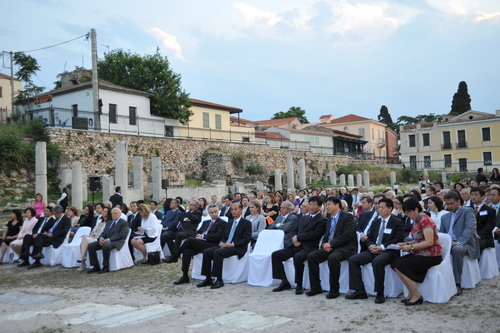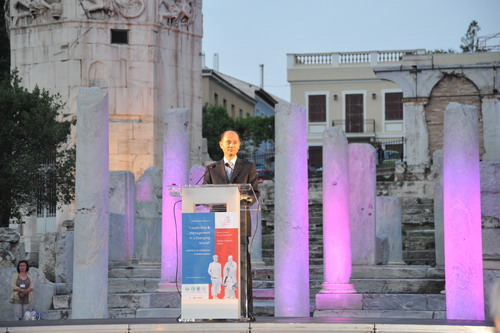| Athens hosted International Forum on leadership inspired by ancient Greek and Chinese Philosophy |
| 2011-06-24 17:15 |
|
ATHENS,June 13(Xinhua)--A revealing, in depth debate on the role of ancient Greek and Chinese philosophy in modern management in a period of economically driven social upheaval internationally was launched on Monday in Athens during a two-day forum organized by Greek and Chinese universities.
Dozens of scholars from the two countries and all over the world present papers and exchange ideas over the valuable lessons ancient philosophers, such as Aristotle, Plato and Confucius, can still teach to humanity at the international conference of its kind entitled "Leadership and Management in a Changing World: Lessons from Ancient East and West Philosophy".
Organized by two leading Universities in
On the evening of June 13th, Chinese Ambassador Mr. Luo Linquan was invited to deliver a speech at the official ceremony held in the ancient Roman Agora of
The Changeable and the Constant: What Chinese Philosophy Reveals to Us --Remarks by Ambassador LUO Linquan at the International Conference on "Leadership and Management in a Changing World: Lessons from Ancient East and West Philosophy" Roman Agora, Your Excellency Mr. President of the Honorable Mr. XU Jialu, Vice Speaker of the 10th National People's Congress, Your Excellency Mme. Minister Ana Diamantopoulou, Dear Rectors Mr. Prastakos and Mr. Shi Jianjun, Esteemed Professors and Scholars, Distinguished Guests, Good evening. First of all, allow me to extend our warmest congratulations on the convening of this Conference on behalf of the Chinese Government. Truly this is a remarkable meeting of minds. Remarkable that it happens in a wonderful country where greatest thoughts were nurtured, political systems experimented, monumental achievements created. Remarkable that renowned scholars of ancient civilizations, The world is a fast changing one, so have discerned ancient Chinese and Hellenic philosophers. Confucius marveled at the bygone departing from us, as if the river runs away night and day. Heraclitus of Ephesus was alarmed by his discovery that "everything changes, and nothing endures."(Πάντα ῥεῖ καὶ οὐδὲν μένει. ) How shall we cope with an ever evolving world? As ancient Chinese philosophers believed, man should embrace constant changes that give rise to new beginnings, and press ahead to bring about reforms. Only with self-improvement, endless vigilance, and advancing with time, could the greatest virtues and grandest undertakings be achieved. Therefore, our histories were marked with statesmen who were bold at reforms, such as Shang Yang and Wang Anshi in What virtues and traits are expected of leaders and managers in a changing world? Chinese philosophers had deep understanding of statecraft and high expectations for leaders. In short, a leader shall be of noble character, one who governs with virtues and cares about the people. Of eminent judgment, one who sees the trends in the trivialness, and prepares for changes beforehand. A leader shall select the right people that are capable and virtuous, and put them in the right position according to merits. Shall unite the entire society or community, mobilize all efforts and play out everyone's potential. Shall implement the proper laws and policies, neither to disrupt people's work in the field, nor to overburden them with obligations, but to reward the good and punish the evil, to make the population happy and attract more from afar. Nevertheless, industrialization, globalization and the internet have dramatically reshaped our world. While the humans have been empowered with ever greater freedom to exploit nature, we are confronted with many insustainabilities of the modern way of life. It is unlikely that we time travel to the past, yet revisiting the wisdoms of our ancestors will help us grasp the present and face the future. As a Chinese idiom has it, throw out bricks to attract the jade, meaning, even a poor opening statement might be followed by priceless opinions. I hope my remarks could serve that purpose. I wish you a successful conference and rich results. Thank you all. |
|


